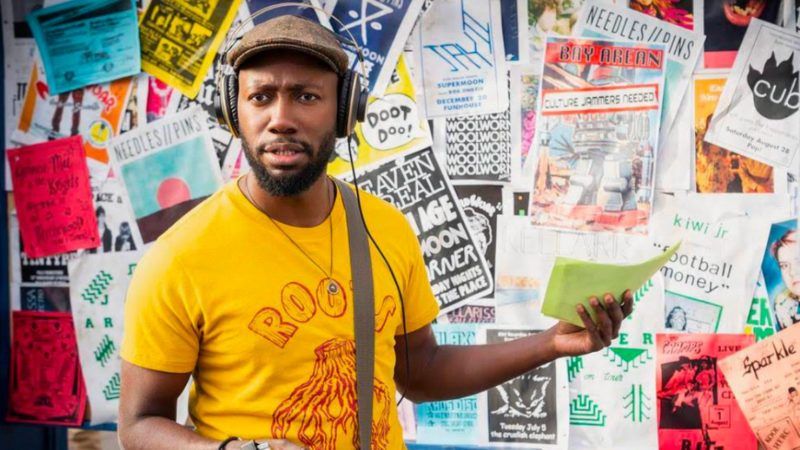Don't Be Afraid: Hulu Comedy Woke Is Genuinely Funny
Wit, both broad and sharp, gets a show about racism further than tirades would.

Woke. Available Wednesday, September 9, on Hulu.
In a dreary age in which we're battered on one side by authentic police mayhem and on the other by puerile PC paladins, Hulu's new comedy series Woke is little short of a miracle. It manages to carefully and very funnily thread a needle through a political and social straitjacket.
Created by cartoonist-rapper-Michael-Jackson-impersonator Keith Knight and Barbershop screenwriter Marshall Todd, Woke is based (with a lot fewer hallucinations, I'm guessing; we'll get to those in a minute) on Knight's cartooning career.
His alter-ego is Keef Knight (Lamorne Morris, New Girl), who draws a strip called Toast and Butter for a dying and penniless local paper. But his life is looking up. "The last time you're going to see broke Keef Knight," he brags to his roommates as he heads off to sign a syndication deal that will launch him into big-league, big-money syndication.
Toast and Butter is, by Knight's own description, "a comic strip about bored breakfast food," and he resents complaints that it's not politicized enough. "Why is it that people of color are always having to stand for something or say something in our work?" he snaps at one (black) editor. "You know, I'm just a cartoonist."
That changes abruptly when Knight is manhandled by (white) cops who mistake him for a mugging suspect. The aftermath: Inanimate objects spring to life to talk to him. Bottles. Mailboxes. Trashcans. His own cartoons. A lot of them agree with the editor and want him to weaponize his artwork, though not all of them are channeling Van Jones. Advises a bottle from a convenience-store beer cooler: "Did you know malt liquor makes black people impervious to bullets?"
The litany of street wisdom starts to alert Knight to some things he hasn't noticed, including that his new syndicate has noticeably lightened his skin in his publicity photo, and his (black) neighborhood barber has been replaced by (white) hipsters who charge 10 times as much but make everybody look like Russell Brand. One of Knight's roommates makes a quick diagnosis: "This nigga woke!"
The problem is that Knight's wokeness looks, to many people, more like craziness, particularly at his highly publicized appearance at a comic-book convention where, goaded on by mocking pens and pencils, he kickboxes with a big cardboard cutouts of himself and his characters even tries to eat them. Gifs of him screaming "Fuck toast and butter!" pop up all over the internet. Knight's career is over before it's begun. "You're gonna be turning tricks in the hay for vegan sliders," gleefully exclaims one of his hallucinations.
Knight the cartoonist's dawning awareness of a racism he's willfully ignored all his life is clearly the major thrust of Woke. But Knight the producer keeps his comedy from turning into a tirade by opening fire on any target of opportunity, particularly the affectations of white liberals. One hires him to come to a cocktail party so her friends can speak to an actual black person, touch his hair, snap selfies with him and introduce themselves with the breathless proclamation that "I don't think O.J. did it!"
Many of the comic balls are kept in the air by Knight's roommates, the (black) horndog hustler Clovis (Chicago comic T. Murph) and (white) professional sperm donor Gunther (Blake Anderson, Workaholics), who's also working to market cocaine as a powdered energy mix. Their sometimes goofball and sometimes cynical takes on Knight's troubled new consciousness are flat-out hilarious. When Knight, inspired by his experience as a paid attraction at the cocktail party, draws a strip titled "Black People For Rent," Clovis promptly puts it on T-shirts.
Knight is outraged. "Blackness should not be a commodity," he insists. Shrugs Clovis: "It's the original commodity." The ability to find that kind of humor in 2020 makes me think we may survive it yet.


Show Comments (38)